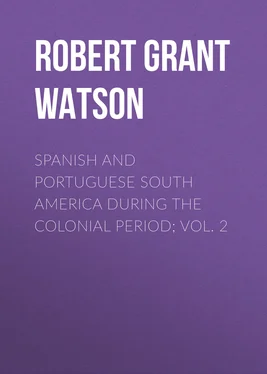Robert Grant Watson - Spanish and Portuguese South America during the Colonial Period; Vol. 2
Здесь есть возможность читать онлайн «Robert Grant Watson - Spanish and Portuguese South America during the Colonial Period; Vol. 2» — ознакомительный отрывок электронной книги совершенно бесплатно, а после прочтения отрывка купить полную версию. В некоторых случаях можно слушать аудио, скачать через торрент в формате fb2 и присутствует краткое содержание. Жанр: foreign_prose, История, foreign_edu, foreign_antique, на английском языке. Описание произведения, (предисловие) а так же отзывы посетителей доступны на портале библиотеки ЛибКат.
- Название:Spanish and Portuguese South America during the Colonial Period; Vol. 2
- Автор:
- Жанр:
- Год:неизвестен
- ISBN:нет данных
- Рейтинг книги:3 / 5. Голосов: 1
-
Избранное:Добавить в избранное
- Отзывы:
-
Ваша оценка:
- 60
- 1
- 2
- 3
- 4
- 5
Spanish and Portuguese South America during the Colonial Period; Vol. 2: краткое содержание, описание и аннотация
Предлагаем к чтению аннотацию, описание, краткое содержание или предисловие (зависит от того, что написал сам автор книги «Spanish and Portuguese South America during the Colonial Period; Vol. 2»). Если вы не нашли необходимую информацию о книге — напишите в комментариях, мы постараемся отыскать её.
Spanish and Portuguese South America during the Colonial Period; Vol. 2 — читать онлайн ознакомительный отрывок
Ниже представлен текст книги, разбитый по страницам. Система сохранения места последней прочитанной страницы, позволяет с удобством читать онлайн бесплатно книгу «Spanish and Portuguese South America during the Colonial Period; Vol. 2», без необходимости каждый раз заново искать на чём Вы остановились. Поставьте закладку, и сможете в любой момент перейти на страницу, на которой закончили чтение.
Интервал:
Закладка:
Following up this success, the Dutch commander next reduced the captaincy of Itamaraca , lying between Paraïba and Pernambuco . Both the camp of Bom Jesus and the port of Nazareth were now simultaneously attacked. The former, being inland and cut off from communication with the latter, suffered greatly from want of provisions. After a three months’ siege the camp surrendered, on the condition that the garrison should march out with the honours of war and have a free passage to the Spanish Indies. No terms were granted to the provincial force, who now became Dutch subjects, and whose first experience of their new rule was that they were shamefully ill-used until they paid the life-ransom which their conquerors demanded. The fortifications of the camp were razed.
The siege of Nazareth was now pressed. The place was so closely beset that no supplies could be introduced into it excepting by sea. The Dutch scoured the country in all directions; but Albuquerque was enabled to introduce some provisions by means of three dismantled barques. These stores, however, could only put off the evil day for a time, and the garrison were reduced to great distress. Many died at their posts from want of food, and at length Albuquerque, who had taken up his post at Villa Fermosa , about six leagues to the south, determined to give up the fort, which accordingly capitulated upon the same terms as had been granted to the camp.
Notice was now given to the inhabitants of Pernambuco of the intention on the part of the Portuguese authorities to evacuate the portion of the captaincy which was situated round the capital. Such of the people as might choose to emigrate were offered protection; but the greater number preferred to submit to the Dutch. About eight thousand persons emigrated, not including Indians or slaves. Their way led past Porto Calvo , which was in the hands of the Hollanders. Albuquerque took precautions against an attack, and a native of the place, who had submitted to the Dutch, was allowed to go out to reconnoitre. He contrived to drop a letter in the sight of the sentinels. This was conveyed to Albuquerque, and informed him that the dreaded Calabar had entered Porto Calvo on the previous evening with two hundred men. On the report of the same informer the Dutch commander was easily persuaded to attack the Portuguese. He fell into an ambuscade, and had to retreat, leaving fifty men on the field. The victors pursuing, entered the fortified place and won it after a desperate struggle, more than half of the garrison being slain. The Portuguese, too, lost heavily; they were not, however, discouraged, and secured every pass by which the enemy might send for succours. The Dutch were now deprived of water, and were closely besieged. After six days they were forced to surrender, and were offered good terms, namely, to be sent by way of Spain to Holland. Porto Calvo was the native place of Calabar, and here he ended his career by being hanged.
Albuquerque now razed the fortifications of Porto Calvo and buried the guns which he had taken. He then conducted the emigrants to the Lagoas , where they dispersed, some going to Bahia and others to Rio de Janeiro . The Portuguese military force now left at the Lagoas consisted of four hundred men, besides Indians, and it was determined to fortify the southern settlement.
The Dutch meanwhile were giving the court of Madrid serious cause for alarm, by building naval arsenals at Recife , such as made them no longer dependent on Europe for the repairs of their fleet. Cornelis Jub, with fourteen vessels, took possession of Fernando Noronha . He thence sailed to intercept the Mexican fleet, and came up with it at the Bahamas . Owing to the misconduct of some of his captains, he failed to capture it; but the danger to which it had been exposed caused the king of Spain to give orders that no efforts should be spared for the recovery of Pernambuco . A force was accordingly prepared for this purpose, and seventeen hundred men were sent forward in advance under Don Luiz de Roxas, who was to supersede Albuquerque. Roxas was landed at the Lagoas with his stores and men.
1635.
1636.
The new Spanish commander displayed no small amount of self-sufficiency, choosing to disregard the advice given him by those who were acquainted with the country. The Dutch, finding great inconvenience from the communication, which it was impossible to prevent, between the Brazilians who had submitted and the Portuguese authorities, now ordered all who dwelt in the district of Porto Calvo to move towards the north. Leaving seven hundred men at Lagoa under the Count of Bagnuolo, Roxas at the beginning of the year began his march northwards with twice that number. He was no sooner on the move than information reached him that the Dutch general had retaken Porto Calvo . Upon this, Rebello was sent forward with two companies to occupy the enemy until the whole should come up. Schoppe, however, did not wait for their appearance, but retreated to Barra Grande . Roxas then learned that another Dutch general was advancing to Schoppe’s assistance, and, having weakened himself by leaving five hundred men at Porto Calvo , he set out in quest of him. The two forces were not long in meeting, but they had to lie on their arms for the night. In the morning, Roxas, who had meanwhile sent for his troops from Porto Calvo , did not wait for their arrival, and in the fight which immediately ensued he was himself slain. The Dutch commander did not pursue his success, but returned to Peripueira .
The command now devolved upon the Count of Bagnuolo. He advanced to Porto Calvo , where eighteen hundred men were collected, and from which place the portion of the country in the hands of the Dutch was now molested. The condition of the inhabitants was indeed deplorable, for they were called upon to serve two masters, whose service was as difficult to reconcile as that of God and Mammon. They were not even allowed to practise their religion in peace, for the Dutch did their best to bring them over to the reformed faith. The conquerors are stated to have treated the colonists with inexcusable cruelty. They were not only liable to death on the slightest suspicion of communicating with the enemy, but were not unfrequently tortured to make them discover their wealth.
Nor was the position of the Dutch a very happy one. They had won three captaincies; but it was their object to develop the resources of these, and as the Portuguese were now in sufficient strength to assume the offensive in a harassing predatory warfare, this was not very easily effected. It is not to be wondered at that the inhabitants of Pernambuco should desire to emigrate, and that four thousand of them should put themselves, with this end in view, under the convoy of the native chief Cameram. They were conducted in safety over seventy leagues of a country subject to the Dutch. Many more, who were unable to join this convoy, attempted to follow and were cut off in so doing.
It being now evident that it was impossible to develop the resources of the country until it should be completely subjected, representations were addressed to Holland with this object in view. The fame and fortune of the war had for the moment turned in favour of the Portuguese. It is interesting to know that up to this date the expenses of the Dutch West India Company amounted to forty-five millions of florins . They had taken from the enemy no fewer than five hundred and forty-seven vessels. More than thirty million florins of prize-money had gone into the public stock; and they had brought home from Africa merchandise to the amount of almost fifteen millions more. Their receipts thus balanced their expenditure, not to mention, their colonial possessions, and the fact that they estimated that they had put the Spaniards to an outlay of nearly two hundred millions. They now resolved to send out Jan Maurice, Count of Nassau, as a general with unlimited powers, and with a force sufficient to complete and secure their conquests. He reached Recife in January 1637.
Читать дальшеИнтервал:
Закладка:
Похожие книги на «Spanish and Portuguese South America during the Colonial Period; Vol. 2»
Представляем Вашему вниманию похожие книги на «Spanish and Portuguese South America during the Colonial Period; Vol. 2» списком для выбора. Мы отобрали схожую по названию и смыслу литературу в надежде предоставить читателям больше вариантов отыскать новые, интересные, ещё непрочитанные произведения.
Обсуждение, отзывы о книге «Spanish and Portuguese South America during the Colonial Period; Vol. 2» и просто собственные мнения читателей. Оставьте ваши комментарии, напишите, что Вы думаете о произведении, его смысле или главных героях. Укажите что конкретно понравилось, а что нет, и почему Вы так считаете.












